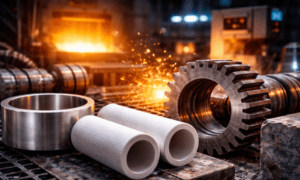When it comes to maintaining a commercial kitchen, certain elements often take priority—food safety protocols, equipment performance, and energy efficiency. However, one critical component that often gets overlooked is the refrigerator gasket. This simple rubber seal, found around the doors of refrigerators and freezers, has a bigger impact than you might think. It’s not just about keeping cold air in; refrigeration gaskets affect everything from energy consumption to food preservation.
In this article, we will uncover the lesser-known but significant benefits of maintaining refrigerator gaskets in a commercial setting.
1. Maintaining Consistent Temperatures for Optimal Food Safety
In a commercial kitchen, ensuring that perishable items are stored at safe temperatures is critical to preventing foodborne illnesses. The refrigerator gasket is the first line of defense in this effort, ensuring that the refrigeration unit maintains a consistent temperature.
Preventing Temperature Fluctuations
When gaskets are in poor condition—whether they’re cracked, loose, or worn out—cold air begins to escape, and warm air seeps in. This temperature imbalance forces the refrigerator to work harder to maintain the set temperature. Not only does this lead to inconsistent cooling, but it also compromises the quality of stored food.
Fluctuating temperatures can lead to the growth of harmful bacteria, putting food safety at risk. Consistent temperature control, thanks to well-maintained gaskets, keeps food fresh and ensures compliance with health and safety regulations.
2. Reducing Energy Waste and Lowering Utility Bills
One of the most overlooked benefits of keeping refrigerator gaskets in good condition is the positive impact on energy consumption. Think of your refrigerator gasket as a gateway between the cold interior and the warm kitchen environment. If that gateway isn’t properly sealed, the refrigerator has to work harder—and longer—to maintain the internal temperature.
Sealing in Energy Efficiency
A refrigerator with a well-functioning gasket operates more efficiently, as cold air stays inside, and warm air stays out. This allows the compressor to run less frequently, significantly reducing energy consumption. In commercial kitchens, where multiple refrigeration units operate around the clock, even a slight increase in energy efficiency can translate into significant cost savings on utility bills.
By maintaining or replacing worn gaskets, businesses can see a noticeable drop in energy use, contributing to both environmental sustainability and cost-effective operations.
3. Extending the Lifespan of Refrigeration Equipment
One of the hidden benefits of gasket maintenance is the extended lifespan of the entire refrigeration system. Refrigerators, like any machine, perform best when they are operating under optimal conditions. When a gasket is compromised, the system has to work much harder, putting a strain on key components like the compressor.
Minimizing Wear and Tear
The constant effort to compensate for temperature loss caused by a faulty gasket can accelerate wear and tear on the refrigeration unit. Over time, this leads to costly repairs and, in extreme cases, a need for a complete system replacement. Maintaining your refrigeration gaskets keeps the refrigerator working within its designed parameters, reducing unnecessary strain and helping it last longer.
By regularly checking and maintaining gaskets, you not only avoid the cost of frequent repairs but also prolong the lifespan of the equipment, delaying the need for expensive replacements.
4. Improving Overall Kitchen Efficiency
Kitchen efficiency goes beyond just cooking speed and order fulfillment. It also involves how smoothly the equipment functions in support of the staff. Inefficiencies in refrigeration can ripple throughout the entire kitchen operation. A refrigerator that isn’t keeping food at the right temperature, due to a faulty gasket, can slow down food prep times and lead to waste.
Keeping Workflow Smooth
A reliable refrigeration unit keeps the kitchen running efficiently by ensuring that ingredients are always at the correct temperature and are easily accessible. A fridge with a deteriorating gasket, however, may experience ice buildup, condensation, and temperature inconsistencies, all of which can complicate food preparation.
Maintaining your refrigerator gaskets helps ensure that your kitchen operates without interruptions or bottlenecks caused by faulty refrigeration. This contributes to a smoother, faster, and more productive kitchen environment.
5. Reducing the Need for Frequent Maintenance and Downtime
Another often-overlooked benefit of properly functioning refrigeration gaskets is the reduction in downtime and maintenance. In any commercial kitchen, downtime due to equipment failure can be costly, both in terms of lost productivity and potential food spoilage.
Minimizing Maintenance Needs
A well-maintained gasket means the refrigeration system is less likely to experience issues that require emergency repairs. Faulty gaskets often lead to icing problems, condensation buildup, and other malfunctions that require professional attention. By keeping gaskets in good shape, you reduce the likelihood of these problems, minimizing maintenance needs and keeping the kitchen running smoothly.
Downtime can severely impact a business, especially during busy periods. Proper gasket maintenance helps avoid unexpected disruptions and ensures that the kitchen continues to operate efficiently.
6. Supporting Environmental Sustainability
With growing awareness of sustainability and the need to reduce energy consumption, businesses are looking for ways to minimize their environmental impact. Maintaining refrigerator gaskets plays a surprising role in these efforts.
Energy Savings and Carbon Footprint Reduction
Energy-efficient refrigeration units use less electricity, which not only reduces costs but also lowers the kitchen’s overall carbon footprint. When cold air leaks from a refrigerator due to a damaged gasket, the unit consumes more energy to compensate. This increased energy usage contributes to higher emissions, which has a negative environmental impact.
By ensuring that gaskets are in good condition, you can improve energy efficiency, reduce electricity consumption, and contribute to a more sustainable operation. Businesses that prioritize sustainability will find that this small step plays a significant role in achieving their goals.
7. Best Practices for Prolonging Gasket Life
While gaskets naturally wear out over time, there are several best practices you can follow to extend their lifespan and maximize their benefits. Regular inspection and simple maintenance routines can go a long way toward ensuring that your refrigerator gaskets stay in top shape.
Routine Cleaning
Dirt, grime, and food particles can accumulate in the creases of the gasket, leading to loss of flexibility and eventual damage. Cleaning the gasket with a gentle detergent and warm water every few weeks can help preserve its elasticity and effectiveness.
Quick Repairs and Replacements
If you spot signs of wear—such as cracks, tears, or brittleness—it’s important to address the issue right away. A quick repair or replacement ensures that your refrigeration unit remains efficient and prevents more costly damage in the future.
Regular Inspections
Incorporate gasket inspections into your routine equipment checks. Look for any visual damage or signs that the gasket is not sealing properly. By catching issues early, you can prevent minor problems from turning into major ones.
Conclusion: Small Maintenance, Big Impact
In the grand scheme of commercial kitchen operations, refrigerator gaskets may seem like a minor component, but their impact is far-reaching. From energy savings and improved efficiency to enhanced food safety and environmental benefits, maintaining your gaskets can transform the way your kitchen operates.
By taking a proactive approach to gasket care, you can keep your refrigeration systems functioning smoothly, reduce energy waste, and avoid the costly repercussions of poor temperature control. Remember, small maintenance steps today can lead to big savings and a more efficient kitchen tomorrow.
Read More From Techbullion



































